The implementation of projects from the Hospital Futures Act (KHZG) is currently in full swing. The financial support for patient portals, cloud computing, digital medication management and digital documentation is intended to significantly increase the maturity of German hospitals by the end of 2024.
Digitization strategy for healthcare and nursing
Now, at the beginning of March, the Minister of Health is presenting a comprehensive digitization strategy, taking aim at the entire healthcare system. From the digitization of health offices, data mining for research, better intersectoral communication to the expansion of applications in outpatient care (e.g., e-prescription, DiGA, DMPs).
Specific plans include a digitization law and a health data utilization law.
Goals and key topics of the digitization strategy
The contents have not yet been fixed by law.
However, the Federal Ministry of Health (BMG) envisages three main topics:
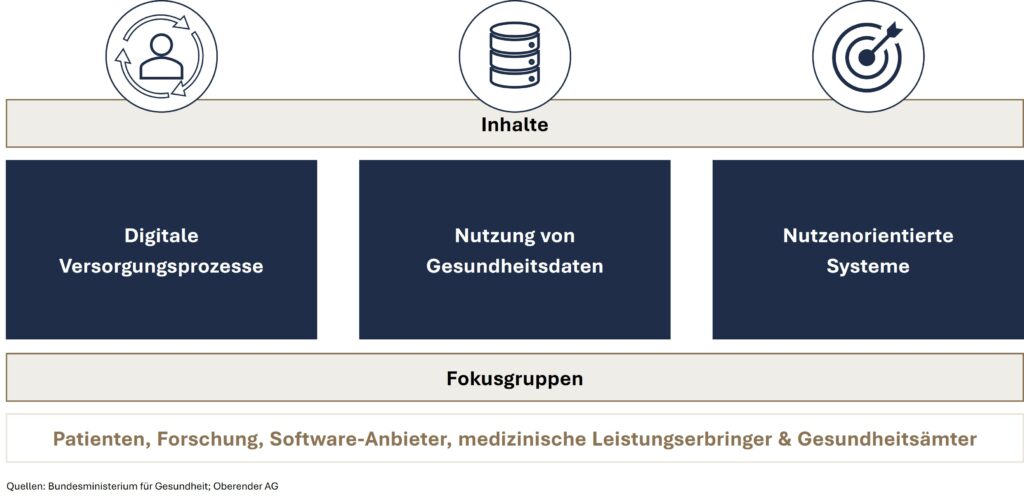
Improving care processes, health data utilization and user-friendliness are comprehensively addressed to all players in the healthcare system (see Fig.). The primary goals of the planned laws are to increase quality and efficiency in medical and nursing care, and to increase patient self-determination and empowerment.
1) Digital supply processes
The focus of improving medical and administrative processes is on faster development and dissemination of ePA applications, assisted telemedicine, and rapid transition to predominantly digital exchange. Patients should be able to obtain better information about care offerings via an information portal. The effect through the KHZG or ÖGD (Public Health Service) funding is to be reflected in a higher digital maturity level of health offices and hospitals. The digital competence of healthcare personnel will be promoted more strongly in the future through training and continuing education programs.
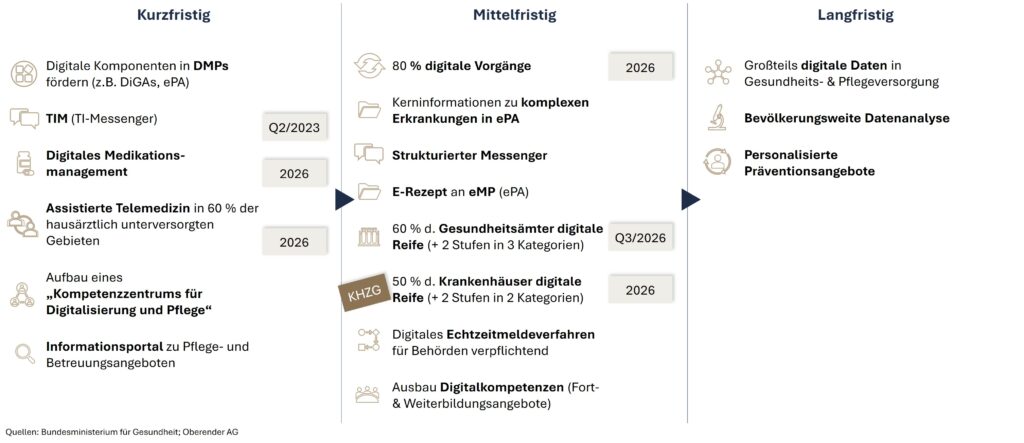
2) Health data use
Germany is also to be strengthened as a research location in the future. The more structured data collection and processing serves, among other things, the better detection of health threats (e.g. pandemics). This includes, for example, billing, supply, study, genomic, and registry data. At the same time, patients should have better access to their own health data.
In the future, data collection will be handled by three central offices:
- Federal Institute of Public Health: Public Health Research
- National Health Data Access Point: Data linkage from different sources for (public health) research.
- RKI: Collection of national cancer registry data
Certain routine data for SHI-accredited physicians are to be transmitted in structured form at defined deadlines, as in the hospital sector.
Overall, data generation, availability and linkage are sustainably promoted.
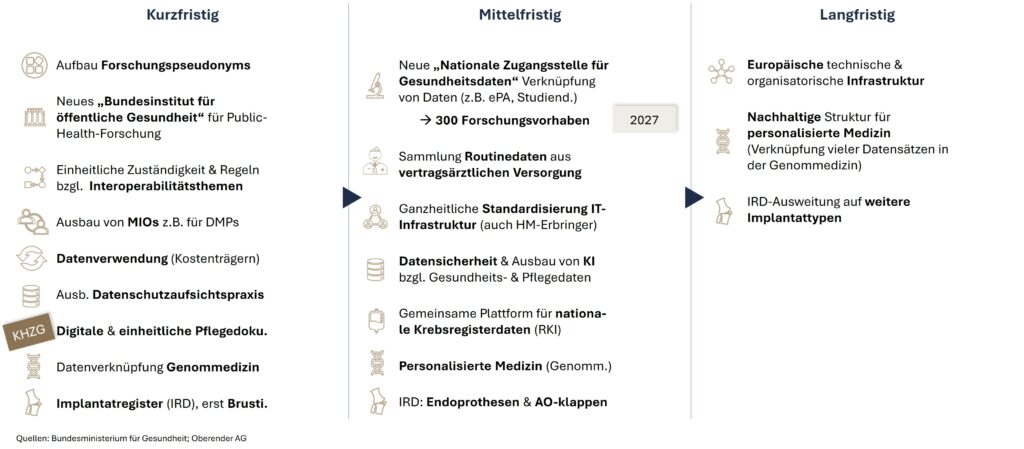
3) Benefit-oriented systems
Another important topic is the user-friendliness of systems. The goal in the future is for patients to receive many applications via the ePA, such as an automatic interaction check or the transmission of MRI data. They should be more involved in the development and technologies should be adapted with regard to energy sustainability.
Until now, gematik has been responsible for the development of the telematics infrastructure (TI) and the ePA. Whereas the BMG last owned 51% of gematik (49% GBA), it will now become 100% with the transformation into the “Digital Health Agency” to ensure faster implementation. The veto rights of the Federal Office for Information Security (BSI) and the Federal Commissioner for Data Protection and Information Security (BfDI) are to be restricted in this context. Instead, the digital agency will in future be advised by an interdisciplinary committee consisting of BSI, BfDI, medicine and ethics with regard to data protection and user-friendliness issues.
ePA services are to be made more readily available overall, DiGAs & DiPAs (digital health or care applications) are also to be expanded in connection with telemedicine. Essential to this is the conversion of the ePA to an opt-out solution.
Whether the ePA will ultimately be filled with life, however, will only become clear in the legislative process.
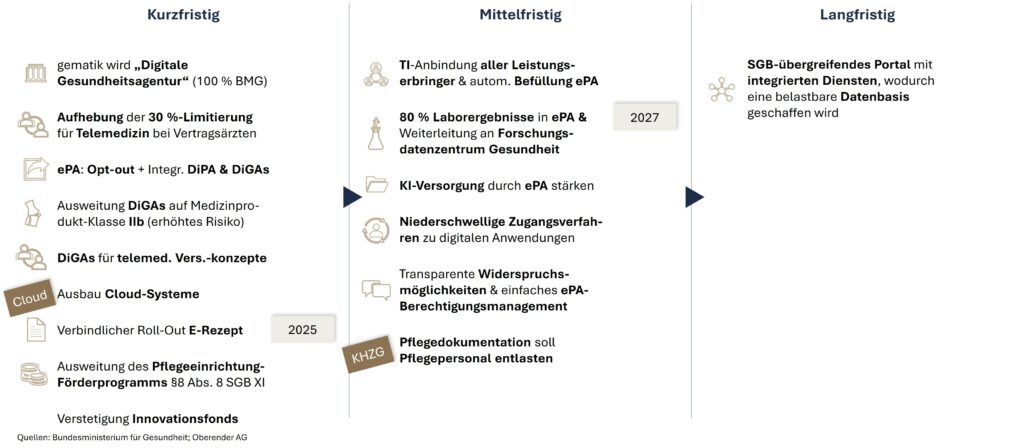
Evaluation
The goals and topics of the digitization strategy are not new territory. Applications of ePA are not currently reaching patients. Media disruptions and lack of interoperability create inefficiencies for providers and utilities.
It can be seen that the BMG wants to drive forward the digital transformation more comprehensively and more quickly overall.
The strategy places greater emphasis on telemedicine and the use of health data for research purposes. The black box of outpatient routine data is to be opened up more in the course of this.
Rolf Grube, Manager Oberender AG Digitalization: “Ultimately, the exact form of the legislation remains to be seen. However, decision-makers at facilities should already be strategically addressing the changes now and in investment and project planning.”
How we can support you
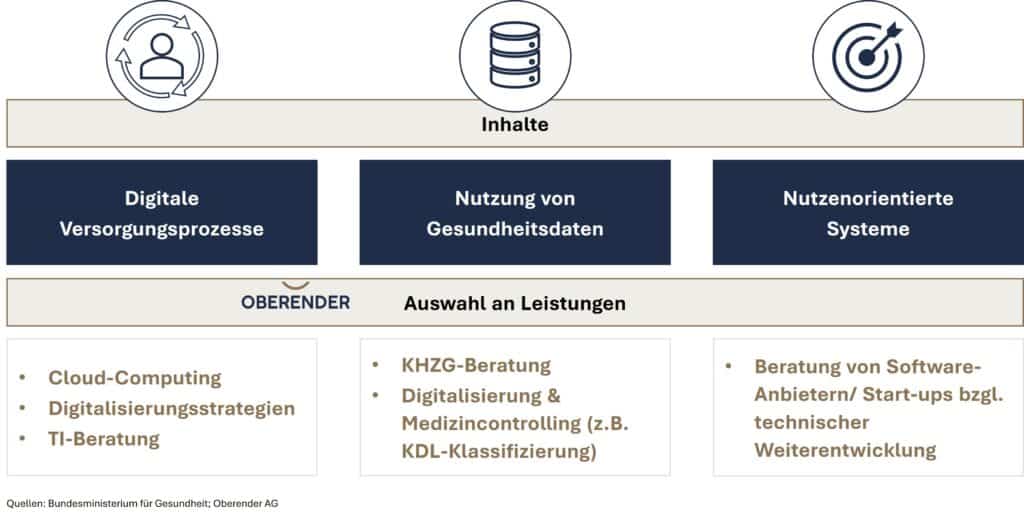
Our digitization team provides you with optimal and tailored support along the three main topics mentioned above.
The IT consultants of Oberender AG have a clinical background and are at the same time influenced by the DNA of Oberender AG.
Within this framework, we provide vendor-independent support together with your team in the development and implementation of needs-based digitization strategies, KHZG or cloud projects.
An example from practice
We were the first hospital in Germany to successfully migrate the “Fachklinikum Mainschleife” in Volkach to the fully cloud-based IT infrastructure of Amazon Workspace (AWS).
This was also reported in the trade press:
– HCM Magazine: Mainschleife Specialist Hospital – HIS in the Cloud
– kma-online: Specialist hospital operates HIS completely in the cloud
Beyond the new requirements of the BMG, hospitals are thus optimally supported in all legal requirements with regard to data protection, archiving and, above all, security.
You can find out more about our “Digitization” area of expertise here.





